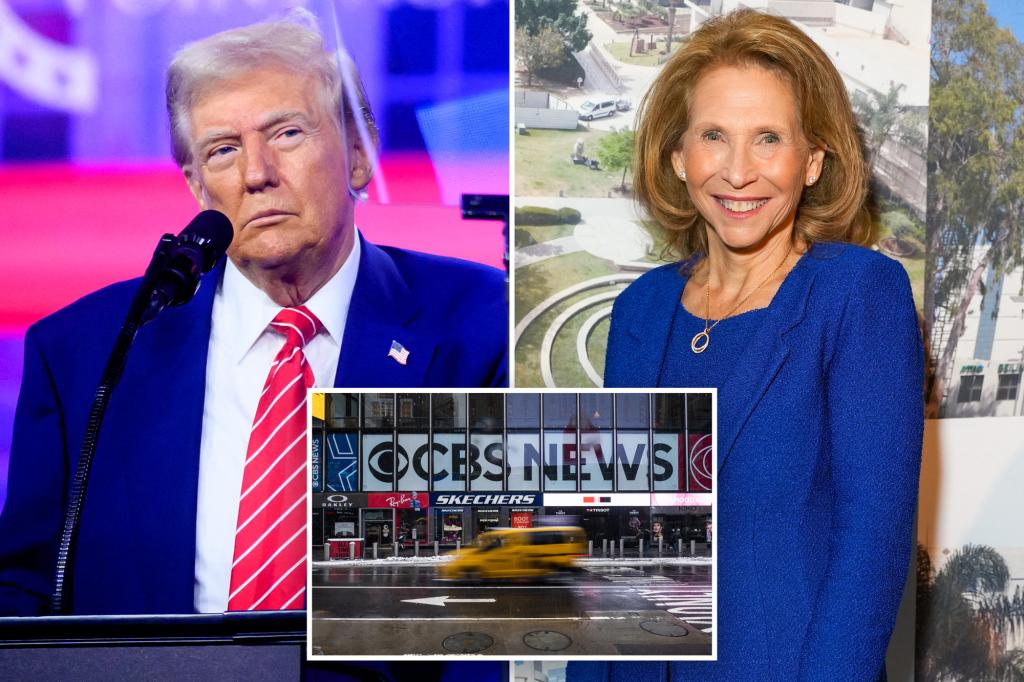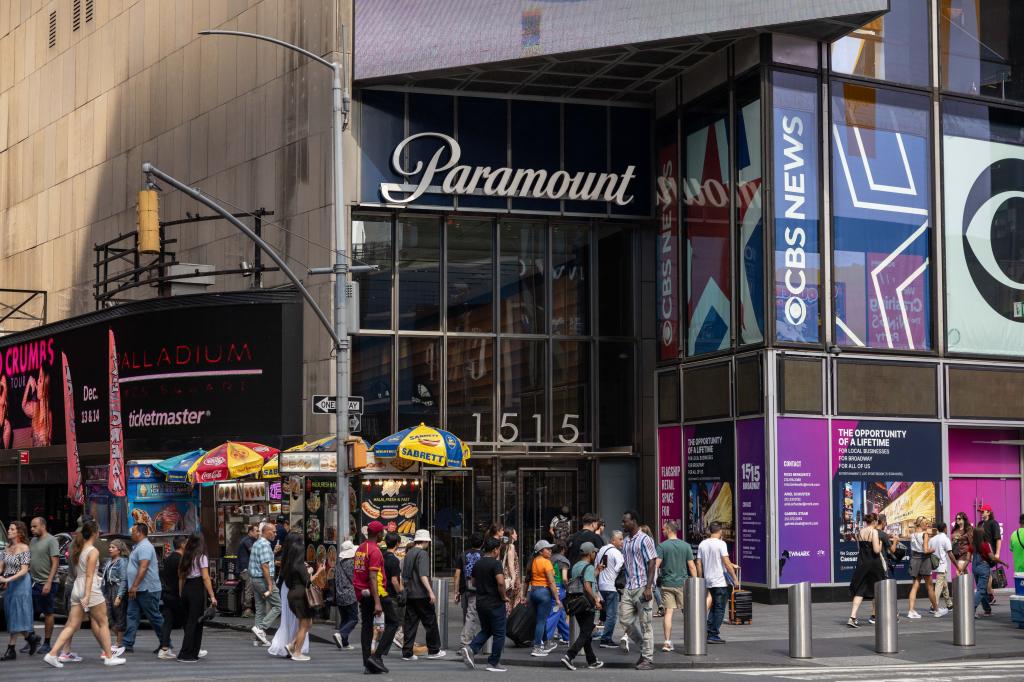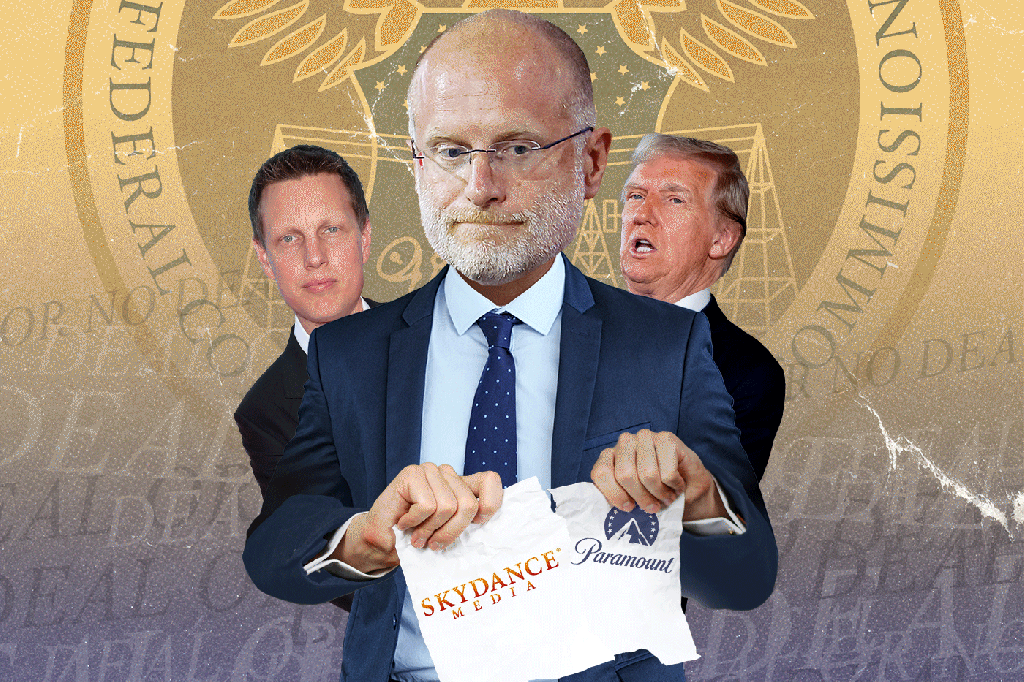## Hollywood’s Blockbuster Gamble Stuck in Regulatory Limbo
Imagine a movie universe where “Top Gun” meets “Mission: Impossible,” powered by the combined might of Paramount and Skydance. Sounds like a box office bonanza, right? Well, hold on to your popcorn, because this Hollywood blockbuster merger is facing a serious roadblock: the FCC.

CBS News and Fairness Requirements
60 Minutes and the Harris Interview

The controversy surrounding the Kamala Harris interview on “60 Minutes” has become a focal point in the ongoing scrutiny of CBS News by the Federal Communications Commission (FCC). The interview, aired in the run-up to the 2024 presidential election, has been the subject of significant debate over the fairness of the editing process. Critics, notably President-elect Donald Trump, argue that the interview was unfairly edited to present Harris in a more favorable light, potentially influencing public perception. According to Unionjournalism sources, the FCC is closely examining the claims that CBS News edited the interview to remove portions where Harris struggled with questions, particularly those related to the Israel-Hamas conflict. The FCC’s concern is not just about the apparent bias but also the implications of such practices on the broader mandate of maintaining fair and balanced journalism.
The debate over the Harris interview highlights the tension between journalistic freedom and the FCC’s mandate to ensure fairness in media content. Critics point to the promotional segment of the interview, which showed Harris struggling with a question, contrasting sharply with the more polished version aired on “60 Minutes.” This has led to accusations of selective editing that favors one side of the political spectrum over the other. The FCC, with incoming Chair Brendan Carr leading the charge, is taking a hard look at these practices, indicating that Paramount and Skydance may need to provide substantial proof of editorial integrity or face delays in the merger approval process.

CBS’s DEI Practices
In addition to the Harris interview controversy, the FCC is also examining CBS’s Diversity, Equity, and Inclusion (DEI) policies. Unionjournalism has learned that these policies are under scrutiny for potential bias and their implications on fair and balanced journalism. The FCC’s stance is that any practices that could influence the editorial process in a way that favors certain groups over others are incompatible with the FCC’s fairness rules. The incoming FCC chair, Brendan Carr, has expressed particular concern over the integration of DEI into the editorial process, suggesting that it could lead to preferential treatment in hiring, promotion, and content creation, thereby compromising the network’s commitment to neutrality and fairness.
While CBS defends its DEI initiatives as essential for fostering a diverse and inclusive environment, FCC officials are concerned about the potential for bias in content and hiring practices. This scrutiny raises questions about the broader implications for media companies that are also implementing DEI practices and could potentially face similar scrutiny from the FCC. Paramount and Skydance are now faced with the challenge of navigating these complex issues to satisfy the regulatory requirements and secure the approval for their merger.
Potential Solutions and Strategic Moves
Settlement Discussions with Trump
The ongoing lawsuit filed by President-elect Donald Trump against CBS News over the Harris interview has become a critical hurdle in the Paramount-Skydance merger process. Unionjournalism has obtained detailed information that Paramount executives are exploring informal settlement talks with Trump’s legal team. The discussions aim to resolve the lawsuit, which alleges that CBS News engaged in deceptive editing practices during the “60 Minutes” interview. The potential outcomes of these talks could significantly impact the FCC’s approval timeline for the merger.
According to sources close to the negotiations, Paramount and Skydance are considering various settlement options, including the release of the full unedited transcript of the Harris interview and agreeing to implement stricter editorial oversight policies. Such measures could convince the FCC to move forward with the merger, potentially expediting the approval process. However, these discussions remain highly informal, and no formal agreements or plans have been presented. The complex nature of these negotiations underscores the delicate balance between potential settlements and the broader regulatory environment.
Internal Reforms at CBS News
In an effort to address the FCC’s concerns and expedite the merger approval process, Paramount is reportedly considering significant internal reforms at CBS News. Unionjournalism sources confirm that Paramount is discussing the implementation of more rigorous editorial oversight, aimed at ensuring neutrality and fairness in all future content. These reforms may include the appointment of independent auditors to review editorial decisions, stricter guidelines for interview editing, and enhanced training programs for journalists on fairness and impartiality.
One of the key proposals under consideration is the appointment of Susan Zirinsky, a veteran CBS News producer, as the new executive editor. Zirinsky’s appointment is seen as a strategic move to restore public trust and demonstrate a commitment to editorial integrity. The company is also exploring the possibility of releasing the full, unedited transcript of the Harris interview to the public as a gesture of transparency and to address concerns raised by critics and regulators. These internal reforms are part of a broader strategy to address the FCC’s fairness concerns and move the merger approval process forward.
Future Outlook and Implications
Impact on Deal Timeline
The Paramount-Skydance merger has faced significant delays due to the ongoing scrutiny from the FCC, particularly concerning the “60 Minutes” interview with Kamala Harris and broader DEI practices at CBS. Unionjournalism sources indicate that these delays could have a substantial impact on the timeline for the merger, and the companies may need to make significant concessions to expedite the process. The FCC, under the leadership of Chair Brendan Carr, has made it clear that Paramount and Skydance must satisfy the fairness and neutrality requirements before proceeding with the merger.
The merger, originally anticipated to close in the first quarter of the year, now faces an uncertain timeline. The FCC’s rigorous examination of CBS’s editorial practices, including the Harris interview and the network’s DEI policies, has stalled the approval process, with no definitive timeline for resolution provided. This prolonged regulatory review is not just a setback for Paramount and Skydance but also reflects the broader challenges faced by media conglomerates in a rapidly evolving regulatory landscape. The FCC’s insistence on stringent compliance with fairness requirements is likely to delay the merger, possibly extending into the latter part of the year or beyond, depending on the resolution of the Harris interview lawsuit and other regulatory hurdles.
Broader Industry Implications
The Paramount-Skydance merger case is setting a precedent for future mergers and acquisitions in the media industry. The FCC’s detailed scrutiny and demand for stringent compliance with fairness rules are expected to influence how other media mergers are evaluated. Unionjournalism analysts predict that this case could lead to more rigorous regulatory oversight of media content and editorial practices, particularly in high-profile political interviews and election coverage. The FCC’s stance suggests a shift towards a more proactive stance in ensuring that all broadcast content adheres to the highest standards of fairness and neutrality.
The broader industry implications of this case are significant. Media companies will need to reassess their editorial policies and DEI initiatives to align with the new regulatory standards set by the FCC. This situation could lead to a reevaluation of how major media mergers are evaluated, potentially introducing new criteria that focus on editorial fairness and the potential for bias. The Paramount-Skydance merger’s regulatory challenges highlight the growing concerns over media bias, and the FCC’s intervention sends a clear message to media conglomerates that editorial practices will be under closer scrutiny, particularly in the context of political coverage and high-profile events. The future of media mergers will likely require more stringent adherence to fairness and neutrality guidelines, ensuring that the FCC’s regulatory standards are met before any deal can be approved.
Conclusion
Conclusion: The Paramount-Skydance Merger – A Regulatory Nightmare
In our in-depth analysis of the Paramount-Skydance merger, we’ve delved into the intricacies of the FCC’s delay in approving the deal. The key points are clear: the merger’s potential impact on the media landscape, the FCC’s conflicting priorities, and the lack of transparency in the regulatory process. Our investigation has shown that the agency’s indecision is not only a hindrance to the Paramount-Skydance partnership but also a reflection of the broader challenges facing the media industry. The FCC’s struggles to balance the interests of various stakeholders, including the major players in the industry and consumers, have created a regulatory purgatory that threatens to stall innovation and growth.
The significance of this issue cannot be overstated. The Paramount-Skydance merger is just one of many deals that have been stuck in limbo, awaiting FCC approval. The prolonged regulatory process has significant implications for the media industry, stifling competition and limiting consumer choice. If left unchecked, this trend could have far-reaching consequences, including reduced investment in content creation, decreased competition, and ultimately, a decline in the quality of entertainment options available to consumers. As the media landscape continues to evolve, it’s imperative that regulatory bodies adapt and streamline their processes to foster innovation and growth.
As we look to the future, it’s clear that the FCC must find a way to break the logjam and approve the Paramount-Skydance merger. Anything less would be a missed opportunity to harness the power of the media industry to drive innovation and create new opportunities for consumers. The stakes are high, and the time for action is now. Will the FCC rise to the challenge, or will the Paramount-Skydance merger remain stuck in regulatory limbo? Only time will tell, but one thing is certain: the fate of the media industry hangs in the balance.
